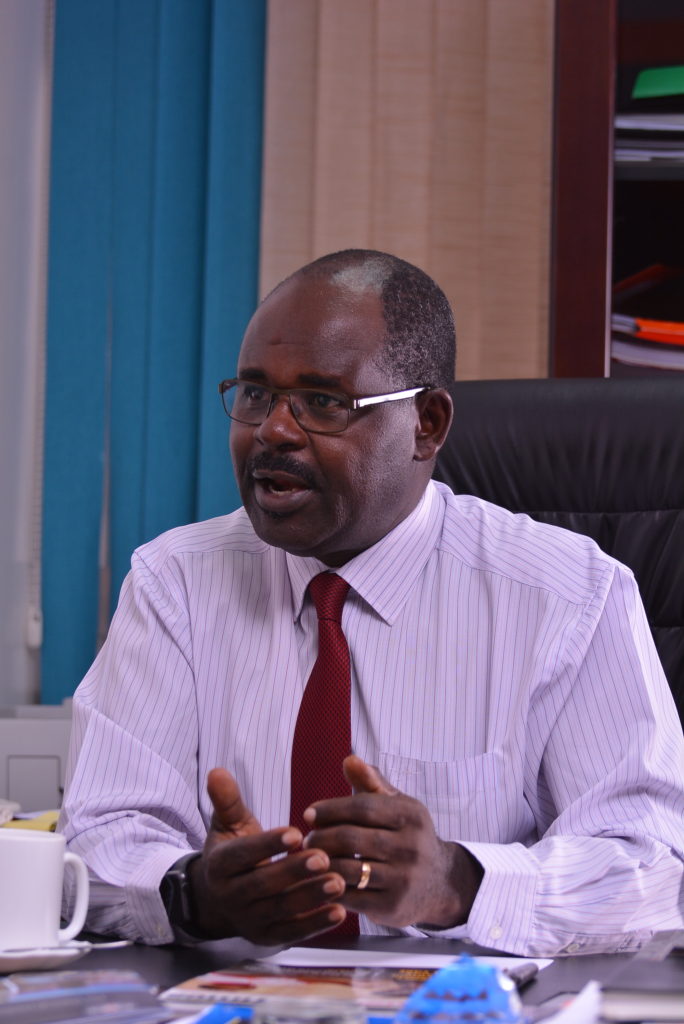Habil Olaka sits calmly at his corner office at the thirteenth floor of International House along Nairobi’s Mama Ngina Street. Dressed in a navy blue suit, white shirt and a maroon tie, he speaks thoughtfully. Every so often pausing to find the right phrase. In person, Olaka is very calm and courteous and exuding a confident air that is helped by décor and paintings in his office. Yet in his mind must be spin of thoughts and emotions, following a series of events in Kenyan business and politics arena that made the last three years ‘difficult’ for him.
As the CEO of Kenya’s bankers umbrella body the Kenya Bankers Association (KBA), the eight years he has been at the helm, he has had various responsibilities including lobbying on behalf of the banking industry and ensuring that banking practice and stability is at par with customer expectations.
The last three years has been a test of resilience and credibility. Kenya’s banking sector was facing a defining moment that threatened its catalytic role as a key driver of the country’s economic growth. Banks were struggling with a combination of issues around capital, liquidity and profitability.
More than 20 bank branches closed in 2017 alone and over 1500 bank staff laid off as banks moved to check their operational costs. The collapse of three mid-sized banks in 2015 and 2016 also showed an emerging pattern of systematic challenges, questionable governance practices, feeble supervision and widespread fraud in the industry.
In addition to these challenges, the amendment of the Banking Act in 2016 that led to the introduction of rate caps also hit the industry. The law saw lending rates capped at four percentage points above the Central Bank Rate (CBR). The deposit rate was set at least be 70 per cent of the lending rate. The move was seen as an effort by the government to curb the runaway interest rates prevailing in the market then.
For Olaka, his main task has been, to first reinstate consumer confidence in the industry. “The collapse of the three banks was brought about by poor governance and widespread fraud and that hurt the confidence of our customers. Key priority was to restore sanity in the industry.”

Habil Olaka, CEO, Kenya Bankers Association.
KBA, in a bid to restore sanity and confidence, signed up to a self-regulatory framework and conduct standards in 2016. “We wanted to ensure that the member banks work towards a shared object that led to the stability of the sector. Self-regulation is among the best ways we felt would boost corporate governance standards.”
The framework led to the introduction of punitive measures against member banks that did not adhere to the self-regulation set.
Olaka who prior to joining KBA, was in charge of portfolio quality and growth at East African Development Bank in Uganda, says that the efforts towards self-regulation are slowly bearing fruits, albeit at small scale. “Self-regulation consisted of being attentive about the interest of the sector stakeholders by addressing concerns before they become crisis.”
Interest rate cap
Sitting on Olaka’s in-tray is getting a workable formula on the interest rate capping that is favorable to the banks and the consumers. He mentions that the law had two functions. First was to stimulate a saving culture among Kenyans by placing a floor on deposits where banks could pay a minimum deposit rate on interest earning accounts. Secondly, it was meant to make lending cheaper and affordable for the common mwananchi.
However, Olaka says the law has not been effective. In fact it has led to greater challenges for the banks and customers. “Currently, market segments deemed to be high risk cannot easily access loans. This has led to credit rationing where lenders are unwilling to advance additional funds to borrowers at the prevailing market interest rate. The risk adjusted return on government debt is higher making it more attractive to lend to government than the riskier borrowers.”
KBA has been lobbying the government to scrap the rate cap law and already, the government is looking to revise the rate cap law. Olaka says the critical thing is that there is now a body of evidence clearly showing the intended positive impact on the economy is not being achieved and to the contrary it is dragging down the output growth rate of the economy.
Pesalink
Away from the hurdles, one of Olaka’s greatest achievement has been the establishment of Pesalink, the money transfer platform that allows for interbank transfers from one person to another on all banks retail payment channels.
Olaka who started his career at audit firm Price Water-house Coopers in the audit and business advisory services division, says the idea was conceived after member banks realized that they were losing close to KSh2.3 billion to telcos through mobile money transfer services.
Pesalink, offered by KBA’s subsidiary – Integrated Payment Services Limited (IPSL) – handles person to person transfer from as allow as KSh10 to Ksh999,999. In its first five months, the platform moved KSh8 billion.
In addition to Pesalink, Olaka is also credited for overseeing the roll-out of a Cheque Truncation System (CTS) introduced in 2011. The system allows banks to electronically clear cheques eliminating the burden of physically carrying documents to the clearing house as well as eliminating fraud in the industry. Previously, the longest cheque clearing period for upcountry cheques would take ten days. This has been reduced to two days.
East Africa Bankers Association
As the CEO of the bankers lobby group in Kenya, he continues to champion for the formation of East Africa Bankers Association. This body he says, will perform some of the function bankers associations do at a national level but now at the regional level.
“We want to engage all the stakeholders such as the regional Customs Union, EALA among others in a bid to replicate what banker’s lobby organizations are doing on the national level to regional level. We see that as a way to support seamless operation of our members.”
Olaka however laments that despite the gain and development of the financial sector, Kenya’s domestic savings are still low. One of the main reasons he cites is that most Kenyans do not have enough income to consume and save.
“This is an opportunity for banks. There is demand for credit and most of the demand is met by informal sources. Banks should extend credit offerings to the customers currently accessing credit in the informal sector.”
Since joining KBA in 2010, Olaka says he continues to remain challenged and invigorated at all times. Kenya’s financial sector is well developed with over 45 registered banks. The banking as a sub sector contributed more than 60 per cent of total assets in the financial sector between January 2016 to March 2017 according to a report by research firm, Research and Markets.
“But we always have to keep an eye on the policy direction concerning the sector,” he says. He notes that in Kenya, legislation can change anytime and that brings the risks of doing away with the progress the sector has already made over the years.
“We need to engage policy makers and propose alternatives,” he concludes.

